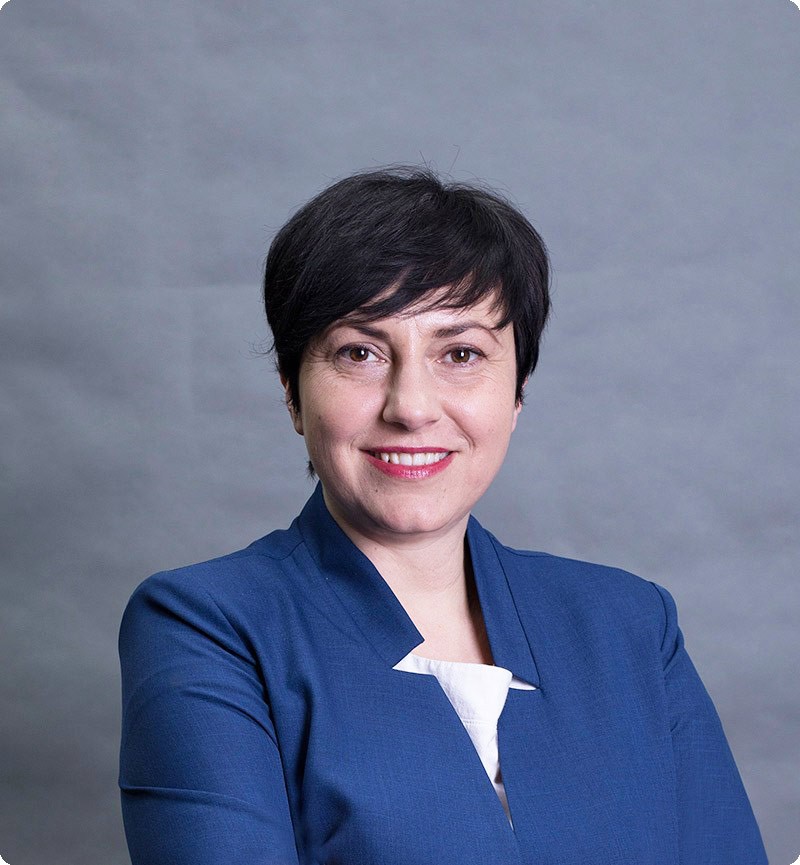Faculty & Staff
Anguelina Popova, PhD
Director
Center for Teaching, Learning and Technology
Administrative Departments
Email: [javascript protected email address]
Phone: +996 (312) 915000 ext. 330
Room: 201
Associate Professor
Non-departmental General Education Faculty
Division of Arts, Humanities and Communication
Email: [javascript protected email address]
Phone: +996 (312) 915000 ext. 330
Room: 201
Associate Professor
Liberal Arts and Sciences Department
Division of Arts, Humanities and Communication
Email: [javascript protected email address]
Phone: +996 (312) 915000 ext. 330
Room: 201

Dr. Anguelina Popova is the founding director of the Center for Teaching, Learning, and Technology at the American University of Central Asia. She holds a PhD in Educational/ Instructional technology from the Open University of the Netherlands (2015), and three Masters degrees from France and Belgium, in Educational technologies, European Politics, and Sociology.
Dr. Popova joined AUCA in 2013 and has since supported faculty development, adoption of educational technology, development of digital humanities, and institutional research. She has been actively engaged in curriculum development of the Digital Cultures Concentration at the Liberal Arts and Sciences program. She has been conducting and supervising research in internationalisation of the curriculum, community building, future of skills, the value of liberal arts education, self-efficacy of students and teachers, digital identity, and Artificial Intelligence.
Dr. Popova is an expert in quality assurance at Ednet Accreditation Agency, has served as vice-chair of the Faculty Senate, Academic Affairs Committee, and is member of the Institutional Review Board, the Sustainability task force Curriculum pillar, and the Strategic plan task force.
- Leading Change Institute, co-organised by EDUCAUSE and CLIR, Washington, DC, 2022
- Willard McCarty Visiting Fellowship in Digital Humanities, King’s College, London, UK | 2019
- Digital Humanities Summer Institute, American University of Beirut, Lebanon, 2019 (AMICAL grant)
- Digital Humanities Summer Institute, University of Victoria, Canada, 2018, (AMICA grant)- Machine Learning track
- European Digital Humanities Summer Institute, Leipzig, Germany, 2017 (AMICAL grant)
- HSP Huygens Scholarship | Netherlands Government | 2008 — 2015
- Artificial Intelligence, learning, cognition, and creativity
- Pedagogy and Digital pedagogy
- Teachers professional development
- Quality assurance, assessment, curriculum design
- Educational technology
- Digital Humanities
- Bojić, L. et al. (2025). Human Doctors Versus AI Models: Advice Perceptions in Serbia, Kazakhstan, and Kyrgyzstan. In: Geroimenko, V. (eds) Human-Computer Creativity. Springer Series on Cultural Computing. Springer, Cham.
- Popova, A. (2015). Primer podcasts to enhance learning from lectures. [Doctoral Thesis, Open Universiteit]. Open Universiteit.
- Popova, A., Kirschner, P. A., & Joiner, R. (2014). Effects of primer podcasts on stimulating learning from lectures: How do students engage? British Journal of Educational Technology, 45(2), 330-339.
- Popova, A., Kirschner, P. A., & Joiner, R. (2014). Enhancing learning from lectures with epistemic primer podcasts activity: A pilot study. International Journal of Learning Technology, 9(4), 323-337.
- Ivanova, M., Nakayama, M., Popova, A., Okamoto, T., Grosseck, G., de Waard, I., ... & Campanella, P. (2013). IEETeL2013 Team. ENVIRONMENTS, 46.
- Ivanova, M., & Popova, A. (2012). Message from IEETeL symposium chairs. In 2013 12th IEEE International Conference on Trust, Security and Privacy in Computing and Communications (p. lxxi). IEEE Computer Society. https://doi.org/10.1109/TrustCom.2012.333
- Ivanova, M., & Popova, A. (2011). Formal and informal learning flows cohesion in web 2.0 environment. Information Systems and Modern Society: Social Change and Global Development, 1-16. DOI: 10.4018/jissc.2011010101
- Popova, A., & Edirisingha, P. (2010). How can podcasts support engaging students in learning activities? Procedia - Social and Behavioral Sciences, 2(2), 5034-5038.
- Edirisingha, P., & Popova, A., (2009). Podcasting: a learning technology, In S. Mishra (ed.). E-Learning: STRIDE Handbook 08, (pp.66-69). New Delhi: Indira Gandhi National Open University
- Ivanova, M., & Popova, A. (2009). An exploration of formal and informal learning flows in LMS 2.0: Case study Edu 2.0. In Proceedings - 2009 IEEE/WIC/ACM International Conference on Web Intelligence and Intelligent Agent Technology - Workshops, WI-IAT Workshops 2009 (Vol. 3, pp. 227-230). IEEE.
- Popova, A., & Kirschner, P.A. (2007). Innovative pedagogical and psychological perspectives of podcasts. In Towards a Philosophy of Telecommunications Convergence Sept. 27–29, 2007, Budapest : Hungary
- Digital Literacy: covers information and AI literacy, visual literacy, digital identity, online privacy. The course is practice-oriented, and engages students in critical AI literacy, multimedia design, and scholarly communication.
- Digital Cultures: focuses on developing critical AI literacy, analysis skills using text analysis tools, scrapping data from the internet, social network analysis, and investigation of internet cultural elements, such as memes.
- Examples of students' works: https://portfolium.com/network/american-university-of-central-asia
- Concepts of Modern Art is an introductory course, students come with close to non prior knowledge and the fascination with which they finish the course is fantastically satisfying. My work utilises technology- students learn to create their own exhibitions and portfolios.
- Art and Technology course focuses on digital art and critical theory. Students localise their understanding of the relation between art, society, and politics, and create their own digital art objects.
- AI in a human world: Skills, Ethics, and Impact. Alongside providing technical explanations and hands-on activities to students on how LLMs work, the course also raises questions about ethics, AI governance, and human/ community agency.
- Contemporary Issues in International Relations, where we explored topics around colonization and decolonization, AI and technological supremacy, climate justice, etc.
- Ph.D. in Educational/Instructional Technology: Open University, The Netherlands.
- Masters Educational technologies,University of Liege, Belgium
- Masters in European Politics, University of Cote d’Azur, France
- Masters in Sociology, University of Cote d’Azur, France
